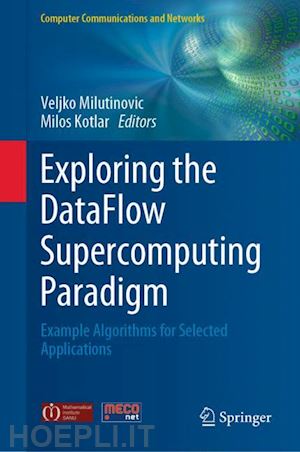
Questo prodotto usufruisce delle SPEDIZIONI GRATIS
selezionando l'opzione Corriere Veloce in fase di ordine.
Pagabile anche con Carta della cultura giovani e del merito, 18App Bonus Cultura e Carta del Docente
The mapping of additional algorithms onto the DataFlow architecture is also covered in the following Springer titles from the same team: DataFlow Supercomputing Essentials: Research, Development and Education, DataFlow Supercomputing Essentials: Algorithms, Applications and Implementations, and Guide to DataFlow Supercomputing.
Topics and Features: introduces a novel method of graph partitioning for large graphs involving the construction of a skeleton graph; describes a cloud-supported web-based integrated development environment that can develop and run programs without DataFlow hardware owned by the user; showcases a new approach for the calculation of the extrema of functions in one dimension, by implementing the Golden Section Search algorithm; reviews algorithms for a DataFlow architecture that uses matrices and vectors as the underlying data structure; presents an algorithm for spherical code design, based on the variable repulsion force method; discusses the implementation of a face recognition application, using the DataFlow paradigm; proposes a method for region of interest-based image segmentation of mammogram images on high-performance reconfigurable DataFlow computers; surveys a diverse range of DataFlow applications in physics simulations, and investigates a DataFlow implementation of a Bitcoin mining algorithm.This unique volume will prove a valuable reference for researchers and programmers of DataFlow computing, and supercomputing in general. Graduate and advanced undergraduate students will also find that the book serves as an ideal supplementary text for courses on Data Mining, Microprocessor Systems, and VLSISystems.Part I: Theoretical Issues.- A Method for Big-Graph Partitioning Using a Skeleton Graph.- On Cloud-Supported Web-Based Integrated Development Environments for Programming DataFlow Architectures.- Part II: Applications in Mathematics.- Minimization and Maximization of Functions: Golden Section Search in One Dimension.- Matrix-Based Algorithms for DataFlow Computer Architecture: An Overview and Comparison.- Application of Maxeler DataFlow Supercomputing to Spherical Code Design.- Part III: Applications in Image Understanding, Biomedicine, Physics Simulation, and Business.- Face Recognition Using Maxeler DataFlow.- Biomedical Image Processing Using Maxeler DataFlow Engines.- An Overview of Selected DataFlow Applications in Physics Simulations.- Bitcoin Mining Using Maxeler DataFlow Computers.











Il sito utilizza cookie ed altri strumenti di tracciamento che raccolgono informazioni dal dispositivo dell’utente. Oltre ai cookie tecnici ed analitici aggregati, strettamente necessari per il funzionamento di questo sito web, previo consenso dell’utente possono essere installati cookie di profilazione e marketing e cookie dei social media. Cliccando su “Accetto tutti i cookie” saranno attivate tutte le categorie di cookie. Per accettare solo deterninate categorie di cookie, cliccare invece su “Impostazioni cookie”. Chiudendo il banner o continuando a navigare saranno installati solo cookie tecnici. Per maggiori dettagli, consultare la Cookie Policy.